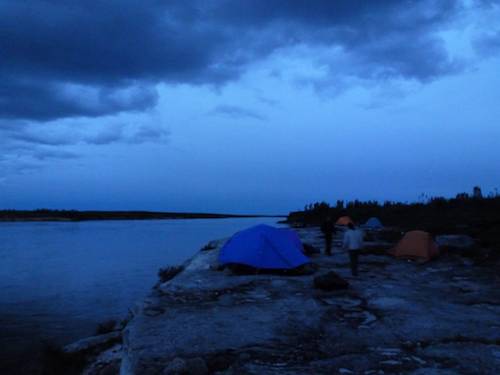The Nature Conservancy's lead scientist Sanjayan and Canada program director Dr. Richard Jeo are on an expedition through one of Canada's most pristine areas with young members of the Dene First Nation. They're canoeing along the Thelon River, ending in North America's largest and most remote wildlife refuge, the Thelon Game Sanctuary.

Photo credit: Ami Vitale
For the past week, it is as if I have been traveling through the Thelon with blinders on. I am like an ant removed from its colony and set down in strange territory.
The only constant is the river, the only direction is down. Without this compass, each vista looks alike, and I am adrift in a featureless terrain.
Now, on our eighth day out, it is as if I am seeing the barren lands for the first time.
I cannot say I understand the landscape, for that is too strong a word. It would be like trying to understand Italy from a postcard of Rome. Rather, I am beginning to glimpse the country as if through a keyhole -- though my field of view is narrow, what I see is sharp.
Around us is a patchwork of eskers (sand and gravel dunes deposited by ancient rivers during the last ice age), hummocks, bogs and muskeg. Stands of dwarf willow thicken the banks of the river in places, and trees scattered singly or in small groves cover some small hill or bluff in no discernible pattern. The trees are mostly black spruce and are in miniature, no more than 3 or 4 meters tall.
Each day the landscape slips by, monotonously, at no more than the pace of a loaded two-person canoe. The sensation is not dissimilar to riding high in the sky in a hot air balloon, and it is as if we were stationary above unrolling textured wallpaper.
Change is constant here -- not in the land, but in how it feels.
It is a hard thing to explain, but for me, no two days have felt much alike.
The moods alter swiftly: a glorious sunny afternoon with crisp colors and clean skies becomes oppressive and dun-colored, or a buggy, windless evening is transformed by a storm into a cold-whipped dawn.
This the Dene know; they rarely speak of the weather in the future tense. To ask for good weather or to be greedy with fortune is to invite trouble.
Joseph Catholique, our Dene guide, simply says, "We accept each day as it is. We pay the land and give thanks -- and don't ask for more."
Now and then he places a pinch of tobacco into the river. Richard and I follow suit with chocolate.
He tells me about a time one early August when he was out hunting with his father, with nothing but a light tarp for a rough shelter, when overnight, a gigantic storm descended, carpeting the ground in heavy, wet snow. The hunting party was trapped by the cold. To keep warm, they had the fires burning all night, using willow twigs tied up in bundles when the wood ran out. For cover, they skinned the caribou they had shot and used the hides for coats and blankets. It was four days before the weather let up and they could move again.
Today is the first day of August.
Overnight, a storm gathered in silence and quickly pounced.
The hot, windless evening of yesterday has been replaced by lashing rain and gale-force winds. Our tents are anchored with heavy rocks, and yet we fear to leave them empty for too long lest they are tossed into the river.
The rain comes down in huge, torrential sheets. Driven by the wind, it finds its way through the smallest weakness in the tent walls. At anchor points, seams and zippers, rivulets form that we mop up.
River travel is impossible now, and an upcoming portage dangerous until the winds subside. The Thelon River is the color of steel; the big sky, granite.
We make coffee and bannock when the rain lets up and save it for later. We drink soup, valiantly cooked over a smoky fire.
We have marooned our canoes on shore and are stuck, but still the barrens roll by.
The geese fly off, the seasons are swift, the caribou are always on the move, they may come or they may not, the weather is but momentary. While we want tomorrow to be either like or unlike today, in the barrens, tomorrow remains until it is ready to be today. This, too, the Dene know; constant change is the only thing predictable here.
Early trappers called the barren lands "the Country." The Dene call it Hazu. Here, you never wake up in the same place twice.
Follow the journey on Twitter and Cool Green Science.